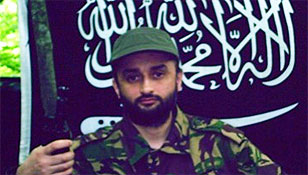
North Caucasus Hit by Wave of High-Profile Assassinations
Publication: Eurasia Daily Monitor Volume: 6 Issue: 113
By:

Reports from the North Caucasus suggest that the region’s armed resistance movement remains highly active and – given the news of several high-profile assassinations in the region this past week – may even be stepping up its activities.
On June 5, the 53-year old Interior Minister of Dagestan, police Lieutenant General Adilgirei Magomedtagirov was killed in the Dagestani capital of Matkhachkala. The head of the Dagestani Interior Ministry’s logistics unit, Aburazak Abakarov, was killed along with Magomedtagirov. Other victims of the shooting included the director of the ministry’s tax crimes department, Abdulzhapar Magomed, who was hospitalized in critical condition, and four other policemen who were members of Magomedtagirov’s personal security detail (RIA Novosti, June 5). This brazen and high-profile assassination was the most serious blow yet to the government’s authority in Dagestan specifically and in the North Caucasus generally.
Magomedtagirov was shot dead as he was leaving a restaurant where the wedding of a friend’s daughter was underway. On June 7, the deputy head of forensic science center of Dagestan’s Interior Ministry, Daud Abdullaev, told the press that the shooter had used a special-forces weapon like the Vintorez silenced sniper rifle, VSK-94 sniper rifle or the Val silenced assault rifle (BBCRussian.com, June 7). The anti-armor cartridges that the killers used are also of a kind typically used against ambush attackers.
The murder is thought to have been committed by two men who used a rifle and a machine gun, which explains why there were a large number of people wounded in the attack that killed Magomedtagirov. In the immediate aftermath of the assassination, Russian Interior Minister Rashid Nurgaliev cut short his business trip to Yalta and returned to Moscow. The head of the Investigative Committee of the Russian Prosecutor General’s office, Aleksandr Bastrykin, and Justice Minister Aleksandr Konovalov are personally overseeing the investigation into the shooting.
Magomedtagirov served as Dagestan’s Interior Minister from 1998 and made more enemies than friends during his 11-year term in Dagestan. Several attempts were made on his life, but each time he got off only with a scare (Kavkazsky Uzel, June 7). It appears, however, that the fourth one was well organized. In all likelihood, the killers were completely confident that the minister would attend the wedding, and the shooters lying in the wait for him were skilled in the use of Russian Special Forces’ weapons.
The minister’s slaying is certain to become a boost to the armed resistance forces of the Sharia Jamaat led by Emir Al Bara against the background of heavy losses inflicted on the insurgency by Special Forces operations conducted by Adilgirei Magomedtagirov to eradicate the rebels. The minister’s murder was undoubtedly the highest-profile hit scored by the rebel fighters recently.
In Chechnya, Musost Khutiev, who served as an assistant to the first deputy chairman of Chechnya’s government, Khalid Vaikhanov, was shot and killed on June 7. Previously, Khutiev was deputy administration head of the city of Argun, a position he was given after he and his unit of rebel fighters left the ranks of the insurgency and joined the federal forces. An Ichkerian brigadier general and the Northern front leader under Aslan Maskhadov’s command, Musost Khutiev received amnesty from the Russian government and was appointed deputy head of Argun’s administration after he and his unit of 33 separatist fighters joined the federal forces in 2002 (Novy Region2, June 7). He was killed as he was visiting acquaintances by a young man who walked up to him in the middle of the street and fired three shots up close, including one to the head.
Incidents of this kind in Chechnya may result in en masse arrests of young men. The Chechen government often tries to put pressure on rebel fighters through the mental and physical harassment of their families. According to the Memorial human rights group, arson attacks on insurgents’ houses and the arrest of members of their family have already become an unspoken norm in the Chechen’s government official policy. These government tactics are what still drives Chechens to seek refuge in Europe in order to escape persecution.
In Kabardino-Balkaria, following the sensational killing of one of the resistance leaders, Musa Mukozhev, on the night of May 10, the government happily reported the slaying of another insurgency figure, the commander of Yarmuk Jamaat of Kabardino-Balkaria, Emir Seifullah (Anzor Astemirov), who occupied the third-highest position in the overall hierarchy of the North Caucasus resistance movement. Two insurgents were killed while resisting a security operation in the city of Nalchik in May 28. In fact, Anzor Astemirov was not one of them, but the name of one of the victims was no less of a sensation. The slain rebel was a Karachaevo-Cherkessia native and the reigning sambo world champion, 25-year old Murat Ristov (Regnum news agency, November 18, 2008). The fact that an athlete who was the pride of many young Circassians had joined the insurgency ranks was as much of a shock as Musa Mukozhev’s killing. That is, more and more often the armed resistance is attracting not just random young people, but educated members of the intelligentsia as well. Therefore, the rebel contingent continues its transformation from one comprised of uneducated rural youth to one consisting of the more cultured elements of the population.
The fact that these incidents are no longer isolated occurrences indicates that the community of Circassian nationalists (such as Kabardinians, Cherkess and Adygs) now includes men who are young, educated and who adhere to Salafist beliefs. This type of player in the Circassian political game will be more radical than his nationalist allies abroad, as these young men have been driven to take up arms by their loss of faith in the likelihood that reaching agreements with the Russian government will help address their issues. They also have no interest in the traditional Circassian customs of Adyge Khabze (a local code of moral and ethical norms), as their first commitment is to the norms of Islamic Sharia law.
Thus while the Russian government continues to claim a complete victory over the rebel forces, in reality it is forced to conduct actions against them almost daily. This only serves to prove that Russia still has a serious conflict in the region with those who refuse to contemplate coexistence, even in theory.




